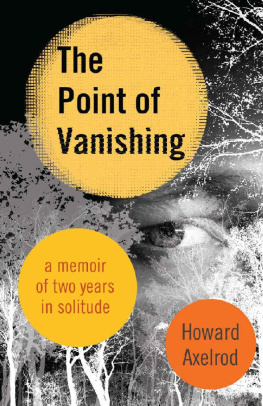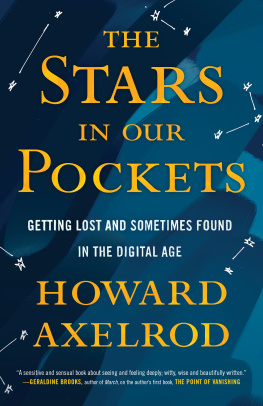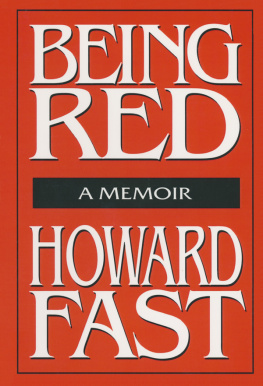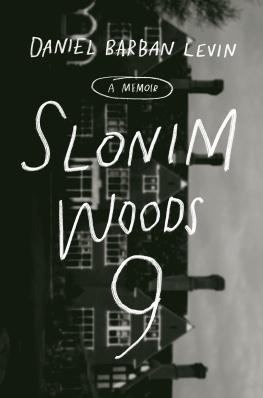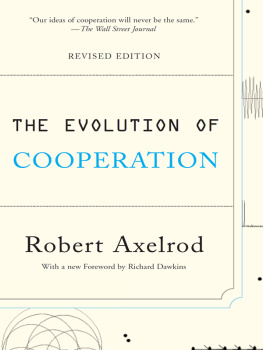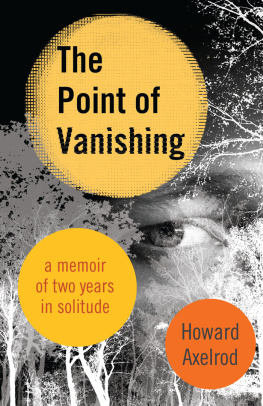PRAISE FOR The Point of Vanishing
Axelrod lyrically captures the essence of nature as he ponders his own self-worth and purpose in life.... In his first book, the author pushes beyond the boundaries and safety nets of the modern world and opens a doorway to feelings and experiences many long for but never encounter. His writing is a balm for world-weary souls. A vibrant, honest, and poetic account of how two years of solitude surrounded by nature changed a man forever.
Kirkus Reviews, starred review
A sensitive and sensual book about seeing and feeling deeply; witty, wise, and beautifully written from beginning to end. When a debilitating accident rocks his world, Axelrod finds himself in free fall, the gleaming trajectory of his successful life suddenly tarnished and unclear. In documenting his retreat to a snowy solitude and the lessons learned there, Axelrod creates a surprisingly suspenseful narrative. I was constantly torn between wanting to savor his prose and tear through the pages to learn what happened next.
GERALDINE BROOKS, author of March
Out of sudden and profound loss, Axelrod has drawn a haunting, tender memoir that grips like an emotional thriller. The Point of Vanishing is raw, exquisitely written, and full of poetic insights. This is a big book about big truths that matter to us all. It delivers a message of hope and strength, and reveals what is most human in our most unspoken yearning for something real, something true.
BELLA POLLEN, author of The Summer of the Bear
Deeply alive and exciting and nuanced, a story of injury and years alone in the woods, The Point of Vanishing is all about what it means to see, and how we might ask ourselves to see differentlyto live differently in our own bodies, and in the world. Though this book is set largely in the snow and silence, there are embers of hunger and questioning and longing that glow deep in its core and refuse to be cooled. Their heat charges and illuminates every moment of these pages. Powerful and ineffable, it feels like a blessing.
LESLIE JAMISON, author of The Empathy Exams
This is a very real book, in bone-on-bone contact with the actual world. It made me think about my own life in new ways, and I think it will do the same for you.
BILL MCKIBBEN, author of Deep Economy
Blindness and insight are the twin subjects of Howard Axelrods intricate and beautiful memoir of his two years of solitude. In detailing his growing estrangement from ordinary life, Axelrod offers a vision of what most of us take for granted. The unimportant falls away, in this book, and what comes closer is a luminous sense of the essential, the beautiful, the sacred, and the unspeakable.
CHARLES BAXTER, author of The Feast of Love
THE
Point
OF
Vanishing
a memoir of
two years in solitude
Howard Axelrod
Beacon Press, Boston
For my parents
Two truths approach each other. One comes from inside, the other from outside,
and where they meet, we have a chance to catch sight ofourselves.
Tomas Transtrmer, from Preludes, translated by Robert Bly
Contents
PART I
Into the Blind Spot
PART II
Learning to See
PART III
The Point of Vanishing
Prologue
The house wasnt something you stumbled upon by accident. It wasnt something you passed going anywhere else. To get there you drove through Glover, Vermonta general store, no traffic light, one Busy Bee Dinerclimbed along switchbacks through maples, evergreens, and birches, then turned left onto a wide dirt road. You passed the barn and blue silo of the Mooreland dairy farm, snaked past a few scattered houses and trailers, then followed deeper into the woods, the maples tapped, tubed, and strung together like prisoners on a chain gang, as it was early March now, sugar season. A few miles in, at a mailbox nobody used, you forked off the wide dirt road onto an unmaintained narrow lane, the deeper snow tugging at your car as though part of a different gravity. You slipped through a tunnel of overhanging trees, came to an empty field bordered by tall pines, then passed an uninhabited house, its siding job left unfinished, then followed as the road dwindled into what seemed only the ghost of a roadno car tracks but your own, the twin trail in the snow behind you like a vestige of the two ruts in summer, when the weeds between them would grow taller than your hood. A small meadow opened on your left, three gnarled apple trees glimmering in the sunlight like chandeliers, and beyond the meadow was the beginning again of forest, with little promise of a house at all. From there, just inside the buried fence-posts, you walked. And at the bottom of the steep grade, with its sky-blue paint flaking, its lines badly canted, sat the two-story house, like a sunken ship.
Not much from the outside world found me there. In the year and a half since Id moved in, there had never been a knock on the door. I had no television, no computer, no cell phone. There was a land line, which rang maybe twice a month, so a wrong number was an event. As for other news, the yellowing issues of the Newport Chronicle, stacked in the corner by the woodstove, reported on beaver problems, church suppers, DWI charges, and missing dogs, but all from years past. Sometimes, kindling the fires embers at dawn, Id find myself wondering about a handsome spotted pointer or the cutest darn black mutt you ever saw. But then Id notice the newspapers date: those dogs had lighted out for their canine dreams two summers earlier, long before the snows.
The only news that didnt reach me with a kind of ghostliness came through the houses windows or from my daily walks up into the woods. Clouds wrestling on a blustery afternoon, sunlight opening through the birches as though from behind a curtain. Slow flurries descending towards dusk. And about once a week, if the roads were clear, Id make the drive down into the town of Barton for groceries at the C&C, then up the curving road to the Lake Parker General Store. West Glovers tiny post office hid at the back of the store, in an elevator-sized room with bars and a window, as though it had once been the towns tiny bank. The young woman behind the counter was no more than eighteen, lovely and bovine in her slowness. She would walk the dirt-worn floorboards very deliberately, past the cooler full of milk, past the six packs of beer, past the canned goods, then enter the post office and check the box for General Delivery. Not wanting to make her any more self-conscious, or myself any more aware of what it would mean to be alone with a woman again, Id wait up at the counter. When she returned, shed blush like something blooming in one of those time-lapse nature movies, the red rising up her neck, then her cheek, the blush all the more vivid when there was no mail for me. Maybe this was because I looked something like a wild animalshaggy beard, eyes too intense. Or maybe it was just because my voice had gone unused since my last trip to the store, and, when I thanked her, too much feeling was stored up inside it. Even to me, my words seemed to come from far away, as though they required travel time, like light from a distant star.
So on that moonless March night, when three raps came at the mudroom door, surprise wasnt the word for my response. Each rap sounded alarmingly inside the house, hardening the posts and beams into place. A current ran through my bodya rattling, physical charge. The blue candle guttered on the table. It seemed I was underwater and something was bobbing on the surface far above me. In the darkened windows to the woods, the reflection of my dinner flickered soft and shadowy, more the idea of a dinner than anything solid. And my image flickered just the same.

